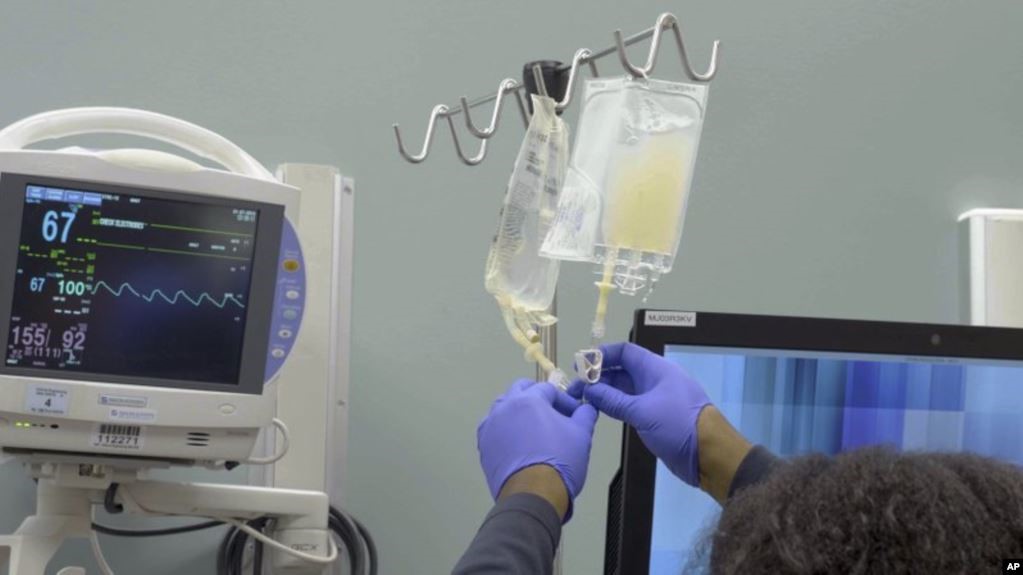Contact Admission
International Collaboration
PHYSICANTS REPORTING THE FIRST US GENETIC CORRECTION Tests on Cancer

In this January 2019 image created from a video provided by Penn Medicine, IV vesicles of CRISPR edited T cells prepared for administration to a patient at Abramson Cancer Center in Philadelphia . (Medicine via AP)
Doctors have reported on the first efforts in the United States to use gene editing to help patients fight cancer.
One form of gene editing appears to be safe when tested in three patients, the doctors said. But it is not yet known what long-term effects this approach will have on cancer treatment or patient survival.
A gene editing tool called CRISPR / Cas9 has been used in trials, recently reported in a medical study. This method was discovered in recent years as a way to alter the genetic material that makes up a human DNA.
DNA stands for deoxyribonucleic acid. It is a carrier of genetic information in cells of living organisms. The CRISPR tool allows altering the DNA to add the necessary genes or take away some if they lead to problems.
Oncology researchers from the University of Pennsylvania Health System took immune system cells from the blood of three patients. They modified the structure of the gene cells to help them recognize and fight cancer. They are then returned to the patient. The editing was completed with no serious side effects, the researchers said.
Treatment removed three genes that may have limited the ability of immune system cells to attack cancer. A new, fourth gene has been added to help others be productive.
Two of the patients had multiple myeloma, leukemia, and the third had sarcoma, cancer that formed in connective tissue or soft tissue. All failed with the repeated traditional cancer treatments.
Then, Edward Itm, the most complex genetic researcher Edward has attempted, Edward, lead researcher, Edward Stadtmauer, told The Associated Press (AP). This is evidence that we can safely modify the genes of these cells.
So far, the cells have survived and have been reproduced as normal, Stadtmauer said.
After two to three months, one cancer patient continued to deteriorate, while another patient's condition did not change. A third patient was treated too recently to measure the effectiveness of her progression. Researchers plan to extend experimental treatment to 15 more patients.
Because gene-editing therapies are so new, Stadtmauer said, it's not clear how large the anti-cancer effects will soon emerge. The patient needs to be monitored more and will need more tests, he said.
A few independent experts, Aaron Gerds, told an AP reporter.
Gerds is a cancer specialist at the Cleveland Clinic in Cleveland, Ohio. He added that other cell treatments for some blood cancers have worked really well, even with diseases that cannot be cured and cured. Gene editing could help improve those treatments, he said.
Chinese scientists are reported to have tried the CRISPR method in cancer patients. The US study is the first known study to be completed outside of China. It took researchers more than two years to get approval from the US government to try it.
Details of the study will be provided at the American Hematology Association's annual conference in December.
Source
:https://learningenglish.voanews.com/a/doctors-report-first-us-tests-of-gene-editing-for-cancer/5158217.html
DOCTORS REPORT FIRST US TESTS OF GENE EDITING FOR CANCER

In this January 2019 image made from video provided by Penn Medicine, IV bags of CRISPR-edited T cells are prepared for administering to a patient at the Abramson Cancer Center in Philadelphia. (Penn Medicine via AP)
Doctors have reported on the first attempts in the United States to use gene editing to help patients fight cancer.
The doctors say one form of gene editing appeared to be safe when tested in three patients. But it is not yet known what long-term effects the method will have on cancer treatment or patient survival rates.
A gene editing tool called CRISPR/Cas9 was used in the tests, which were recently reported in a medical study. The method was discovered in recent years as a way to change the genetic material that make up a person’s DNA.
DNA is short for deoxyribonucleic acid. It is the substance that carries genetic information in the cells of living things. The CRISPR tool makes it possible to change DNA to add needed genes or take some away if they lead to problems.
Cancer researchers from the University of Pennsylvania Health System took immune system cells from the blood of the three patients. They changed the structure of the cells’ genes to help them recognize and fight cancer. They were then put back in the patients. The researchers said the editing process was completed with no serious side effects.
The treatment removed three genes that might have been restricting the ability of the immune system cells to attack the cancer. A new, fourth gene was added to help the others work effectively.
Two of the patients suffer from multiple myeloma, a blood cancer, and the third has sarcoma, cancer that forms in connective or soft tissue. All had failed with repeated traditional cancer treatments.
“It’s the most complicated genetic, cellular engineering that’s been attempted so far,” the study’s leader, Edward Stadtmauer, told The Associated Press (AP). “This is proof that we can safely do gene editing of these cells.”
So far, the cells have survived and have been reproducing as they should be, Stadtmauer said.
After two to three months, one patient’s cancer continued to worsen, while the condition of another patient was unchanged. The third patient was treated too recently to effectively measure her progress. The researchers plan to expand the experimental treatment to 15 more patients.
Stadtmauer said that since the gene editing treatment is so new, it is not clear how soon major anti-cancer effects will be seen. Patients must be followed further and more tests will be needed, he said.
“It’s very early, but I’m incredibly encouraged by this,” one independent expert, Aaron Gerds, told an AP reporter.
Gerds is a cancer specialist at the Cleveland Clinic in Cleveland, Ohio. He added that other cell therapies for some blood cancers have worked very well, even “taking diseases that are uncurable and curing them.” He said gene editing could provide a way to improve on those treatments.
Chinese scientists are reported to have attempted the CRISPR method on cancer patients. The U.S. study is the first known research to be completed outside China. It took researchers over two years to get approval from the U.S. government to try it.
More details about the study are to be provided at the yearly conference of the American Society of Hematology in December.
Other news
- How Dangerous Is Nipah Virus? Medical Alert and Urgent Health Recommendations ( 14:13 - 27/01/2026 )
- Predicting Disease from Sleep – A New Breakthrough Study ( 14:01 - 13/01/2026 )
- Medical advances predicted to break through in 2026 ( 13:54 - 12/01/2026 )
- Vietnamese medical miracles in 2025 – inspiration for medical students ( 07:54 - 07/01/2026 )
- Updating the SOFA-2 Score: A New Standard in the Assessment of Multiple Organ Failure After Three Decades ( 10:40 - 31/12/2025 )
- Home AEDs: High Life-Saving Effectiveness, but Not Cost-Effective at Current Prices ( 14:12 - 18/12/2025 )
- Artificial Intelligence and Pediatric Care ( 08:27 - 16/12/2025 )
- Applying Clinical Licensing Principles to Artificial Intelligence ( 09:36 - 08/12/2025 )
- U.S. Approves Targeted Lung Cancer Therapy Datroway ( 08:43 - 25/06/2025 )
- Therapeutic potential and mechanisms of mesenchymal stem cell-derived exosomes as bioactive materials in tendon–bone healing ( 08:38 - 23/11/2023 )


















